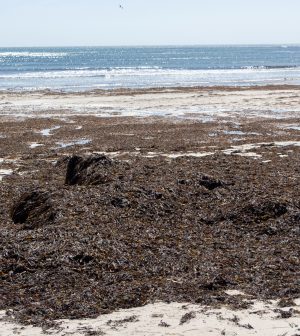- Could Your Grocery Store Meat Be Causing Recurring UTIs?
- Are You Making This Expensive Thermostat Error This Winter?
- Recognizing the Signs of Hypothyroidism
- 10 Strategies to Overcome Insomnia
- Could Artificial Sweeteners Be Aging the Brain Faster?
- Techniques for Soothing Your Nervous System
- Does the Water in Your House Smell Funny? Here’s Why
- Can a Daily Dose of Apple Cider Vinegar Actually Aid Weight Loss?
- 6 Health Beverages That Can Actually Spike Your Blood Sugar
- Treatment Options for Social Anxiety Disorder
Huge Mass of Sargassum Seaweed Is Targeting Florida’s Coast, With Hazards to Health

Be cautious when heading to Florida’s beaches this summer, an expert warned, as a 5,000-mile floating mass of sargassum seaweed has begun washing up on the state’s shores.
It can be low risk in some instances, but it also has the potential for triggering serious respiratory health issues.
“The sargassum itself is not dangerous. It can have different jellyfish and sea creatures in it that could be a source of sting,” said Dr. Sarah Shafer, medical toxicologist and an assistant professor in the department of emergency medicine at Baylor College of Medicine in Houston. However, “once the sargassum washes up on the beach, in 48 hours it will start to break down and lose toxic gasses. As it decomposes, we have to worry about potential exposure to humans.”
Sargassum can decompose in one of several ways. It can release ammonia and hydrogen sulfide, which is toxic, she explained in a college news release.
Even at low levels, hydrogen sulfide can produce the smell of rotten eggs. Yet when the gas reaches a certain level, humans can become “nose-blind” and not smell it.
“At low levels, it smells like rotten eggs in the air. This happens in natural hot springs, like at Yellowstone. It can cause some irritant effects,” Shafer said. “In high levels, it can cause sudden death.”
This can be a concern in closed-off places where the gas is highly concentrated, such as in a sewer.
A chemical asphyxiant, it can interfere with how cells function, Shafer noted.
For beach seaweed, asphyxiation is not a concern because it’s not closed off. Still, she recommended paying attention to different smells when around seaweed this summer.
Look for the smell of ammonia or rotten eggs, irritated eyes, nausea and soft tissue irritation if you touch a piece of seaweed with a higher concentration of hydrogen sulfide.
Those most at risk are people who have asthma or another respiratory condition or live near the beach.
Anyone with respiratory concerns should leave the area if they smell rotten eggs, Shafer advised.
“If you don’t feel good, get away from it,” she said. “If there is enough sargassum that’s off-gassing that much, you won’t want to be there anyway.”
More information
The National Oceanic and Atmospheric Administration has more on sargassum seaweed.
SOURCE: Baylor College of Medicine, news release, May 25, 2023
Source: HealthDay
Copyright © 2026 HealthDay. All rights reserved.










